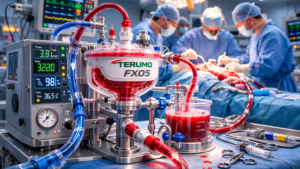This retrospective study, conducted at Ankara Etlik City Hospital, evaluates the intraoperative and early postoperative outcomes of modified del Nido cardioplegia (DNC) compared to classic blood cardioplegia (BC) in patients undergoing coronary artery bypass grafting (CABG) with low ejection fraction (EF ≤ 35%). Myocardial protection is critical in these high-risk patients to reduce postoperative morbidity and mortality. The research included 123 patients (108 males, 15 females, mean age: 62.2 years) treated between December 2022 and December 2023.
Patients were divided into two groups based on the cardioplegia solution used: the BC group (n=74) and the DNC group (n=49). Key outcomes assessed included aortic cross-clamp (XCL) duration, cardiopulmonary bypass (CPB) duration, inotropic support requirements, defibrillation during CPB weaning, postoperative troponin levels, atrial fibrillation, and EF changes one month after surgery. Both cardioplegia methods employed a hypothermic strategy, but DNC demonstrated advantages, particularly in the reduction of defibrillation needs, inotropic agent usage, and incidence of atrial fibrillation.
Key Findings:
- Inotropic Requirements and Defibrillation:
- DNC significantly reduced the need for dopamine and dobutamine (p=0.04 and p=0.05, respectively), highlighting its ability to support better myocardial recovery.
- Fewer patients in the DNC group required defibrillation during CPB weaning (p=0.01), possibly indicating improved myocardial stability.
- Postoperative Troponin Levels:
- At 12 hours post-surgery, the DNC group had lower troponin levels (p=0.03), suggesting reduced myocardial injury compared to the BC group.
- Atrial Fibrillation and Transfusion Needs:
- The DNC group had a significantly lower incidence of postoperative atrial fibrillation (p=0.03).
- Although there was a trend towards reduced blood transfusion requirements in the DNC group, the difference was not statistically significant.
- EF and Overall Outcomes:
- Both groups showed comparable EF improvement one month postoperatively (p=0.08), suggesting equivalent long-term myocardial protection.
- There were no differences in CPB or XCL times, ICU or hospital stays, or mortality rates, further establishing DNC as a safe alternative to BC.
Study Limitations:
The study is limited by its retrospective design, potential bias due to non-randomized surgeon-selected cardioplegia, and the involvement of two surgical teams. Future randomized controlled trials are needed to validate these findings.
Implications for Clinical Practice:
This study highlights that modified del Nido cardioplegia is a viable and potentially advantageous option in CABG patients with impaired EF. Its ability to reduce postoperative complications like atrial fibrillation and inotropic requirements may make it preferable in high-risk cardiac surgeries.







